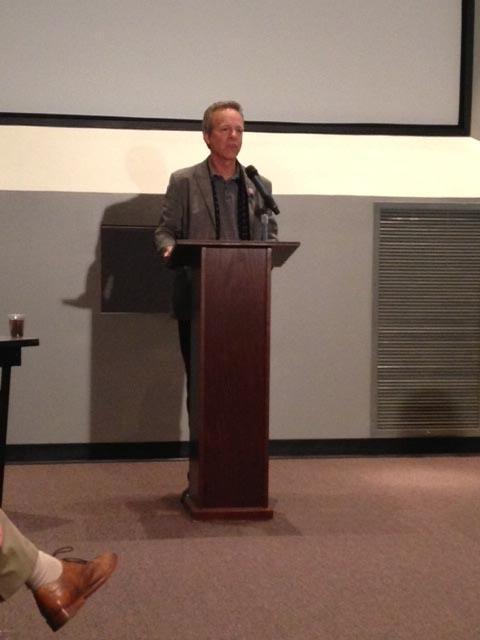
Mark McKinnon speaks to members of the Dallas Press Club last night. (Julie Fancher / The Daily Campus)
Former Chief Media Advisor to President George W. Bush, Mark McKinnon spoke to members of the Dallas Press Club about his organization No Labels last night.
McKinnon spoke at the KERA building in Dallas and then fielded questions from members of the audience on the impact of No Labels.
The objective of No Labels, which was founded in 2010, is to gather Republicans, Democrats and Independents to push Congress to work together and to get more done.
In order to understand the fruition of No Labels, McKinnon described his background and how he came to realize there was more important matters than just the label of your political affiliation.
McKinnon was originally a member of the Democratic Party until he met former Gov. George W. Bush.
“I’ve been able to watch the arc of politics in the country for the last few decades,” McKinnon said.
He then became a member of the Republican Party and worked with Bush on his 2000 and 2004 Presidential campaigns.
“One of the things that attracted me to Bush was that he was a Republican, but very different than the Republicans in Washington,” McKinnon said. “He worked very closely with the Democratic Lieutenant Governor Bob Bullock, they worked in a very bipartisan fashion, and they got a lot done.”
McKinnon saw that during Bush’s 2000 Presidential campaign a large part of his message was to change the culture of Washington, which is a message that resonated largely with much of the country.
While Bush was a Republican, his message to change the culture was very similar to the one of President Obama, just eight years later.
“If you looked at [Obama’s] speeches in 2007, and Bush’s in 1999, you wouldn’t be able to tell the difference,” McKinnon said.
For those who say the Washington culture does not need change, McKinnon points out that Congress is not the same as it used to be.
“People will say listen it’s America, it’s democracy, it’s messy, but you have a hard time convincing me, and if not me certainly members of Congress like Olympia Snow or other people who have left the Senate or the U.S. Congress after being there for 20, 30 years and they will say that it is absolutely different than 30 years ago,” McKinnon said.
It’s not just politics that are becoming more partisan, but the country as well. One of the main factors for this is the growth of technology.
“Technology has allowed the means to assimilate, no longer just geographically, but electronically with people that think and act alike,” McKinnon said.
The moment McKinnon realized something needed to change was during a State of the Union address.
“There was a moment for me when President Obama was giving a State of the Union speech and a member of Congress yelled out at him, ‘liar’. And I just said, wow. That was too much for me,” McKinnon said. “The system has evolved to a point where it rewards bad behavior and punishes good behavior.”
This seemingly skewed system of punishments and rewards, and the behaviors of many members of Congress, is what spurred a growing frustration among the American people.
No Labels had served as the platform for the American people to voice their concern and vehicle change.
“It serves as a centrist kind of voice, the idea that the extremes were well represented, but not the middle,” McKinnon said.
While No Labels is aimed to get Congress to work together, they are not jumping straight into ideological issues, such as immigration reform or same-sex marriage.
Instead they are focusing on the issues that creating paralysis within Congress such as primary reform and campaign finance reform.
“We decided that what the people really want is problem solving,” McKinnon said, “they want a government to act and respond to the problems we’ve got.”
The basic idea is to give Congress a work agenda to respond to these problems.
“These are mechanical ideas that just make common sense, that if implemented will make Congress work and function,” McKinnon said.
One of their first plans of action is ‘No Budget, No Pay.’
“We decided we should propose an incentive, people don’t get paid if they don’t work,” McKinnon said.
‘No Budget, No Pay’ passed in the House and Senate in January 2013.
“We realized how powerful something like this can be and how grassroots organizations can work,” McKinnon said.
The next step was to create a No Labels Problem Solvers Coalition. This group would consist of members of Congress who have agreed to work across the aisle and who will work on these big issues.
When the coalition was announced in early 2013, 34 Congress members had signed up. That number has risen to 53.
To McKinnon, this is improvement, and signs that even Washington may be ready for a change.
“As broken and dysfunctional as Washington seems there are some signs that things are shifting,” McKinnon said.










